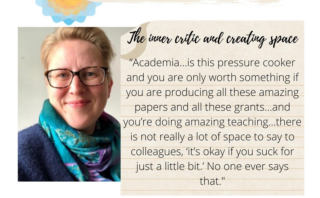I recently realised I’ve been tricking myself when I set my goals. Instead of doing what matters, I worked diligently through my to-do list, completing admin, writing blog posts, creating social media campaigns for my business.
But my most important goal was left aside.
That goal was filling in the forms for my divorce.
I told myself that I was intentionally saying “no” to that goal to avoid overwhelm and set healthy boundaries.
In reality, I wasn’t doing “good planning”. I delayed this task because I was scared. Scared of losing financial stability. Scared of hurting my kids. Terrified of a potential custody battle.
So a few days ago, I stared at this goal on my list and was ready to push it to another week, when it suddenly dawned on me.
The divorce was a “Catalyst Goal”.
If only I filled in that form, my low mood and anxious energy would be lifted, and I would feel confident to take the next steps towards freedom. The goal could be a catalyst to a better life. Within seconds, I reframed my fear and felt motivated.
This was a profound insight for me, and I want to share my understanding of Catalyst Goals with you to help you tackle the right goals that could potentially transform your life.
In this article, you will apply 3 steps to use the power of Catalyst Goals:
(1) Identify your Catalyst Goal
(2) Clarify the motivation behind that goal
(3) Commit to prioritise this goal
Working with a to-do list makes you diligent.
Working with “Catalyst Goals” sets you free.
I’ve watched hundreds (or maybe thousands) of writers work on articles, books, and building a following on social media.
The biggest challenges they face are:
- Staying motivated
- Differentiating themselves
- Being trapped by too many projects
- Struggling to make real shifts in the way they set their goals
They end up overwhelmed and burned out.
And writing becomes something to dread.
Here’s a better way.
The Power of “Catalyst Goals”
A catalyst goal pushes your life to new levels like not other goal can:
- It gets you a significant step closer to becoming your Future Self
- It might be big and scary, but once it’s completed, you have new skills, abilities, connections or confidence to do future projects faster and easier
- It can be tiny but impactful e.g. completing a 2-hour admin task to free up more time to work on your business; taking 5 minutes to say “no” to a collaboration request to free up mental space
- Not working on this goal clutters your mind and keeps you distracted — you stay ‘small’
Most people just tick goals off their to-do list. In fact, even if you understand the idea of prioritisation, you probably still don’t work on your Catalyst Goal as much as you should.
The problem is that you might end up working twice as hard as you have to, and still feel stuck. Working with catalyst goals is a mindset shift and strategy that can be life changing.
Here’s how to do it, step by step.
Step 1: Identify a Catalyst Goal

Take a look at your to-do list and try to identify which of your goals are “catalysts”. Here are three questions to help you:
1. Does completing this goal get me significantly closer to my Future Self?
2. Will completing this goal give me upgraded skills and a new mindset to do future projects faster?
3. Does *not* completing this goal clutter my mind?
What catalyst goal comes to mind for you? Is it big or small?
Step 2: Uncover the Goal’s Value
The real value of a Catalyst Goal is that it brings potential for change. Often, the catalyst goal is less important than what it gives you once it’s done. So, let’s clarify the real value of your catalyst goal.
Here are a few examples of the ‘hidden’ value behind your Catalyst goal.
- Writing a self-help book is a catalyst to give you visibility and expert status, so clients or collaborators find you faster. Plus, you can apply your writing skills in all your content books.
- Starting a podcast sounds like a lot of work, but it’s a catalyst that allows you to legitimately invite and interview influential people who would otherwise not speak with you.
- Creating an online course is time consuming, but once it’s launched, you’ll have passive income and more time to spend with family or build your business.
- Submitting your dissertation helps you position yourself on the job market and gives you time to recover from all those years of research.
Since I’m a former academic and writing coach, these Catalyst Goals feel true to me. But what about you?
What hidden value behind your Catalyst Goal would make your life better, and easier?
Step 3: Prioritise the Catalyst Goal
Don’t step into the trap that I’ve been sitting in for weeks with my divorce forms.
A catalyst goal can be small or big, but often it’s scary or unpleasant (otherwise, you’d have done it long ago). What I see from writers and creators I work with is that Catalyst Goals are often delayed because they bring change. Is that a paradox? Not really.
Your brain doesn’t like change because it’s unfamiliar.
That’s why it’s important to start with small steps, and establish a habit to plan and prioritise your Catalyst Goals (for writing projects, The Write Habit Planner will help).
Here are tips that help you create that habit:
- Reserve 30-90min to work on your Catalyst Goal every day
- Schedule work on your Catalyst Goal before any other goals that are less important (and less scary)
- If it’s big, break down your Catalyst Goal into micro steps to make it easier
- Celebrate each tiny bit of progress
- Find someone to hold you accountable or guide you throught the process of achieving your goal
If you follow these steps and start paying attention to Catalyst Goals whenever your plan your weekly activities, you can make a massive mindset shift.
And I want you to remember:
Working productively is great, but working on the ‘right goals’ can change your life!
Even if it’s a scary divorce form.
_________________________





